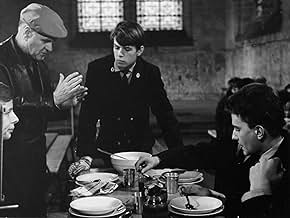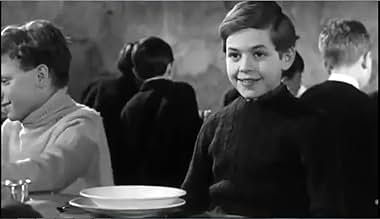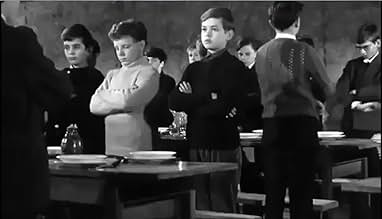NOTE IMDb
7,6/10
3,2 k
MA NOTE
Au pensionnat de jésuites, le jeune Alexandre tombe amoureux d'un nouvel arrivant (un plus grand). Les directeurs de conscience ont mis leurs garçons en garde contre 'les amitiés particulièr... Tout lireAu pensionnat de jésuites, le jeune Alexandre tombe amoureux d'un nouvel arrivant (un plus grand). Les directeurs de conscience ont mis leurs garçons en garde contre 'les amitiés particulières', pernicieuses ; l'amour est ici interdit même aux coeurs purs. [255]Au pensionnat de jésuites, le jeune Alexandre tombe amoureux d'un nouvel arrivant (un plus grand). Les directeurs de conscience ont mis leurs garçons en garde contre 'les amitiés particulières', pernicieuses ; l'amour est ici interdit même aux coeurs purs. [255]
- Réalisation
- Scénario
- Casting principal
- Récompenses
- 1 nomination au total
Gérard Chambre
- André Ferron
- (non crédité)
Henri Coutet
- L'employé de l'institution
- (non crédité)
Dominique Diamant
- Maurice Motier
- (non crédité)
Alain-Philippe Malagnac
- Un élève
- (non crédité)
Bernard Musson
- Le père enseignant
- (non crédité)
Colette Régis
- La religieuse
- (non crédité)
Avis à la une
Another Delannoy 's film which needs restoring to favor in its native France where the director's reputation,because of the stupidity of the fusty Cahiers du Cinema,has definitely sunk.Delannoy,almost a centenarian,worked till 1995 ,but "Les Amitiés Particulières" is his last good movie.I'm happy to notice that there's not one single negative comment on it.Proof positive that non-French are better at judging French Films.Maybe the rating is currently a bit too high (8,9),but if it can help Delannoy get out of oblivion where he has fallen,so much the better.
Delannoy ,transferring a novel which was very popular in the sixties,depicts a world which no longer exists.Lines warn us before the cast and credits:times have changed,iron discipline is now a thing of the past,but there are things which never change: the first emotions of the adolescence.
Some people wrote there was a "gay interest" in the movie.I do not think it is so.If Georges falls for Alexandre ,it is because he lives in a man's man's man's world.Except for the scene of the prize giving day,there are no women,a fortiori girls in the film.And this is a world where religion reigns everywhere,a world where young aristocrats or wealthy bourgeois study under the priests' extremely watchful eye.
Best performance comes from Didier Haudepin,a wunderkind (like Brigitte Fossey in "Jeux Interdits" ) who grew up to become a director ("Paco l'Infallible " starring the late Patrick Dewaere) and an actor ("Les Assassins de l'Ordre" one of Marcel Carné's last efforts) but without any real success.When he appears ,holding the lamb,it is a transparent metaphor of purity.Alexandre's and Georges's love will remain pure and platonic .Their relationship reminds me of that between Le Petit Prince and the aviator in Saint-Exupery's famous novel.Their meetings in the greenhouse are extremely well filmed .That was not such an easy subject for the sixties and the pejorative word "academic" with which the highbrows often label Delannoy does not make any sense here.
Delannoy ,transferring a novel which was very popular in the sixties,depicts a world which no longer exists.Lines warn us before the cast and credits:times have changed,iron discipline is now a thing of the past,but there are things which never change: the first emotions of the adolescence.
Some people wrote there was a "gay interest" in the movie.I do not think it is so.If Georges falls for Alexandre ,it is because he lives in a man's man's man's world.Except for the scene of the prize giving day,there are no women,a fortiori girls in the film.And this is a world where religion reigns everywhere,a world where young aristocrats or wealthy bourgeois study under the priests' extremely watchful eye.
Best performance comes from Didier Haudepin,a wunderkind (like Brigitte Fossey in "Jeux Interdits" ) who grew up to become a director ("Paco l'Infallible " starring the late Patrick Dewaere) and an actor ("Les Assassins de l'Ordre" one of Marcel Carné's last efforts) but without any real success.When he appears ,holding the lamb,it is a transparent metaphor of purity.Alexandre's and Georges's love will remain pure and platonic .Their relationship reminds me of that between Le Petit Prince and the aviator in Saint-Exupery's famous novel.Their meetings in the greenhouse are extremely well filmed .That was not such an easy subject for the sixties and the pejorative word "academic" with which the highbrows often label Delannoy does not make any sense here.
This is the film adaptation of Roger Peyrefitte's novel telling the deeply moving love story of brilliant 16 year-old aristocrat Georges de Sarre and beautiful 12 year-old Alexandre Motier at St. Claude's, a French, Catholic boarding-school in the 1920s. Though chaste, their love is passionately expressed through poems, gazes and the odd kiss, and there is no mistaking the sensuality underpinning it.
Whether consummated or not, for many centuries such intense love affairs between younger and older boys were a feature of boarding-school life that brought joy and relief to some of the more feeling and less hung-up sort of adolescents, as well as grief and catastrophe to the minority whose liaisons were discovered and crushed by the Christian authorities. They were essentially pederastic, satisfying different emotional needs in the younger and older participants, though the disparity in age lent them special intensity for both.
This ancient tradition more or less died a generation or so ago; the boys who would once have partaken or at least have approved of romantic friendships nowadays either never see their appeal, brought up as they are in a society so antagonistic to them, or shun them through terror of being misunderstood and branded as gay. Indeed, the number of reviews of this film implying gayness is proof they are right to fear it is now practically impossible to escape being judged according to the new dogma insisting on a fixed sexual orientation for even early teens.
It is salutary to remember that however responsible the priests at St. Claude's were for the tragedy of Alexandre and Georges and however misguided the abhorrence of sin that drove them to act as they did, they acted as gentle lambs compared to the savagery with which their post-Christian successors today would crush an affair that any older and younger boy had the temerity to get embroiled in. Our new moral dictators would of course destroy Alexandre to save him from an unequal relationship rather than from the sin of homosexuality, but that would make no difference to either the cruel outcome or the monstrous bigotry behind it. Ironically it would actually increase the perverse injustice of such interference: Alexandre is typical of the younger boy in a special friendship in that his emotional need for it is evidently greater and so it is even more vital to his happiness than to Georges's that it should not be broken up.
Considering special friendships at boarding-school seem to have disappeared from our emotional landscape and are now so badly misunderstood, we must be forever thankful that in the short space of time when they were still fairly widely understood and it had also become possible to write candidly about such delicate matters, not only did such a talented writer as Peyrefitte preserve their character for us so evocatively, but that a film was made of it before the moral panic about teenage sexuality which arose in the 80s made such an undertaking unthinkable.
Unsurprisingly, the film is not as outstanding as the novel, though mostly faithful to it. The most significant change is that, in the novel, Georges was only fourteen, but as he seemed a little improbably sophisticated for even a French patrician of that age, this was actually an improvement. The problem with the adaptation to film is largely the common one of condensation. Because we do not get to know the protagonists quite so well, it is harder to be so deeply moved by their plight. Mostly gone too is the richly elaborated conflict in the boys' minds between the influences of puritanical Christian doctrine and the boy-admiring Graeco-Roman attitudes it drove into hiding. Nevertheless, the film is well acted, atmospheric and near the end soars towards the heights of aching pathos achieved in the novel.
Peyrefitte was much involved in the making of the adaptation to film, which makes for a fascinating footnote: he was rewarded by meeting on the set the love of his life, 12-year-old Alain-Philippe Malagnac, who had a minor role in the film as a choirboy and introduced himself to the author as a fan of the novel, a story Peyrefitte recounted in Notre amour (1967).
Edmund Marlowe, author of Alexander's Choice, an Eton love story, www.amazon.com/dp/1481222112
Whether consummated or not, for many centuries such intense love affairs between younger and older boys were a feature of boarding-school life that brought joy and relief to some of the more feeling and less hung-up sort of adolescents, as well as grief and catastrophe to the minority whose liaisons were discovered and crushed by the Christian authorities. They were essentially pederastic, satisfying different emotional needs in the younger and older participants, though the disparity in age lent them special intensity for both.
This ancient tradition more or less died a generation or so ago; the boys who would once have partaken or at least have approved of romantic friendships nowadays either never see their appeal, brought up as they are in a society so antagonistic to them, or shun them through terror of being misunderstood and branded as gay. Indeed, the number of reviews of this film implying gayness is proof they are right to fear it is now practically impossible to escape being judged according to the new dogma insisting on a fixed sexual orientation for even early teens.
It is salutary to remember that however responsible the priests at St. Claude's were for the tragedy of Alexandre and Georges and however misguided the abhorrence of sin that drove them to act as they did, they acted as gentle lambs compared to the savagery with which their post-Christian successors today would crush an affair that any older and younger boy had the temerity to get embroiled in. Our new moral dictators would of course destroy Alexandre to save him from an unequal relationship rather than from the sin of homosexuality, but that would make no difference to either the cruel outcome or the monstrous bigotry behind it. Ironically it would actually increase the perverse injustice of such interference: Alexandre is typical of the younger boy in a special friendship in that his emotional need for it is evidently greater and so it is even more vital to his happiness than to Georges's that it should not be broken up.
Considering special friendships at boarding-school seem to have disappeared from our emotional landscape and are now so badly misunderstood, we must be forever thankful that in the short space of time when they were still fairly widely understood and it had also become possible to write candidly about such delicate matters, not only did such a talented writer as Peyrefitte preserve their character for us so evocatively, but that a film was made of it before the moral panic about teenage sexuality which arose in the 80s made such an undertaking unthinkable.
Unsurprisingly, the film is not as outstanding as the novel, though mostly faithful to it. The most significant change is that, in the novel, Georges was only fourteen, but as he seemed a little improbably sophisticated for even a French patrician of that age, this was actually an improvement. The problem with the adaptation to film is largely the common one of condensation. Because we do not get to know the protagonists quite so well, it is harder to be so deeply moved by their plight. Mostly gone too is the richly elaborated conflict in the boys' minds between the influences of puritanical Christian doctrine and the boy-admiring Graeco-Roman attitudes it drove into hiding. Nevertheless, the film is well acted, atmospheric and near the end soars towards the heights of aching pathos achieved in the novel.
Peyrefitte was much involved in the making of the adaptation to film, which makes for a fascinating footnote: he was rewarded by meeting on the set the love of his life, 12-year-old Alain-Philippe Malagnac, who had a minor role in the film as a choirboy and introduced himself to the author as a fan of the novel, a story Peyrefitte recounted in Notre amour (1967).
Edmund Marlowe, author of Alexander's Choice, an Eton love story, www.amazon.com/dp/1481222112
Or mgic. or refreshing. or mysterious. or provocative. the film is the long shadow of the novel. and the novel is the right challenge for discover and explore an universe , in strange way, more familiar than you expect. a film about a sort of friendship. not comfortable, many, for a part of public. but useful. not exactly for the message. but a perspective about love, life and young ages , escaping from the ordinary definitions.
At first I did not think that the movie will be interesting. But I soon changed my opinion. The fact that the movie is in black and white makes it even more appealing than if it was in colour. The action takes place in a boarding school located in France. Actually the scenes from the dinning room reminded me of the movies for Harry Potter.
The main characters are Georges de Sarre 16 years old student and the young Alexandre (age 12) who is a student at the same school. Their friendship is really beautiful and heart touching. It sure brought some old memories too. There is a lot of poetry in this movie it seems that I am getting hocked to poetry- again! Few years ago there was a girl who was sending me sonnets of Shakespeare. I even tried to write some poems myself. I still haven't finished watching the movie it turned out to be on two CDs and I only got one of them, but will get the second one soon- then I will complete this review.
I have finished watching the movie and its ending made me sad sad and disgust. Disgust that there are such people who refuse to accept that a true, special friendship can exist and interfere to hurt everyone, but their pity selves. And do I know of such people because they are not only shown in the movies you know they lurk amongst us trying to make the rest believe and thing what they do such people really disgust me .
Les amitiés particulières is based on 1943 novel by French writer Roger Peyrefitte.
The main characters are Georges de Sarre 16 years old student and the young Alexandre (age 12) who is a student at the same school. Their friendship is really beautiful and heart touching. It sure brought some old memories too. There is a lot of poetry in this movie it seems that I am getting hocked to poetry- again! Few years ago there was a girl who was sending me sonnets of Shakespeare. I even tried to write some poems myself. I still haven't finished watching the movie it turned out to be on two CDs and I only got one of them, but will get the second one soon- then I will complete this review.
I have finished watching the movie and its ending made me sad sad and disgust. Disgust that there are such people who refuse to accept that a true, special friendship can exist and interfere to hurt everyone, but their pity selves. And do I know of such people because they are not only shown in the movies you know they lurk amongst us trying to make the rest believe and thing what they do such people really disgust me .
Les amitiés particulières is based on 1943 novel by French writer Roger Peyrefitte.
Francis Lacombrade stars as the young Comte Georges de Sarre, student at a French boarding school run by the priests. Didier Haudepin is the even younger Alexandre, another student at the same school. It is post WWII France, and the school is run with heavy discipline.
Georges develops a special friendship with Alexandre, hence the title of the novel and the movie made from the novel. Roger Peyreffite is quite a famous French author, and this story is his best work.
The two boys develop their friendship in spite of the rules of the fathers who are dead set against this sort of thing happening at their school. Not that there is anything sensual about the relationship, just a few chaste kisses and poems with Georges describing Alexandre as his "bijoux".
There is a touching scene in the movie with the two boys hidden in a haystack lying besides each other, sharing the joy of their company and a stolen cigarette.
Not to give away the ending, but tragedy befalls the two boys.
Interesting to note that a friend of Peyreffite, who also worked as a French civil servant, Henri de Montherlant also wrote a novel about the love between two boys. The Boys is also set in a Catholic boarding school, but around the turn of the 19th century. And a similar tragic ending.
In both stories, the Church and its rules against too much affection between schoolboys plays a major role in the story as one of the antagonists. We are left wondering just how well both stories might have turned out if the boys had been left alone to share their friendships.
Georges develops a special friendship with Alexandre, hence the title of the novel and the movie made from the novel. Roger Peyreffite is quite a famous French author, and this story is his best work.
The two boys develop their friendship in spite of the rules of the fathers who are dead set against this sort of thing happening at their school. Not that there is anything sensual about the relationship, just a few chaste kisses and poems with Georges describing Alexandre as his "bijoux".
There is a touching scene in the movie with the two boys hidden in a haystack lying besides each other, sharing the joy of their company and a stolen cigarette.
Not to give away the ending, but tragedy befalls the two boys.
Interesting to note that a friend of Peyreffite, who also worked as a French civil servant, Henri de Montherlant also wrote a novel about the love between two boys. The Boys is also set in a Catholic boarding school, but around the turn of the 19th century. And a similar tragic ending.
In both stories, the Church and its rules against too much affection between schoolboys plays a major role in the story as one of the antagonists. We are left wondering just how well both stories might have turned out if the boys had been left alone to share their friendships.
Le saviez-vous
- AnecdotesIn the source novel, Georges de Sarre is 14 years old and Alexandre Motier is 12 years old. However, the year in which the film was made, Francis Lacombrade (1942-) was 22 years old and Didier Haudepin (1951-) was 13 years old.
- GaffesWhen Lucien looks at his watch we can see that the time is 6:15 but he reads it as 10:35.
Meilleurs choix
Connectez-vous pour évaluer et suivre la liste de favoris afin de recevoir des recommandations personnalisées
- How long is This Special Friendship?Alimenté par Alexa
Détails
- Date de sortie
- Pays d’origine
- Langue
- Aussi connu sous le nom de
- This Special Friendship
- Lieux de tournage
- Abbaye de Royaumont, Asnières-sur-Oise, Val d'Oise, France(jesuit college where the story takes place)
- Sociétés de production
- Voir plus de crédits d'entreprise sur IMDbPro
- Durée1 heure 40 minutes
- Couleur
- Mixage
- Rapport de forme
- 1.78 : 1
Contribuer à cette page
Suggérer une modification ou ajouter du contenu manquant

Lacune principale
By what name was Les amitiés particulières (1964) officially released in India in English?
Répondre




















